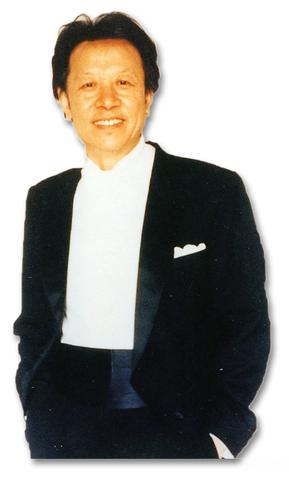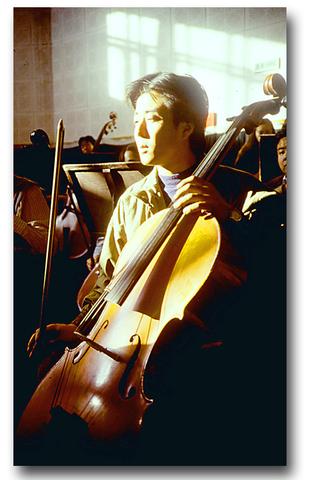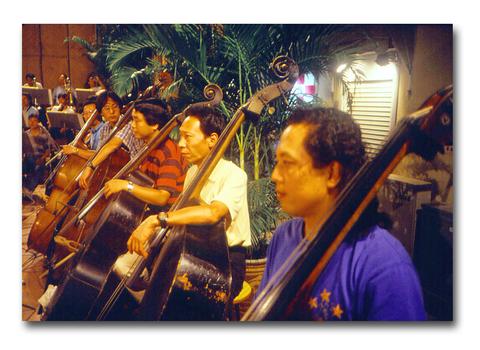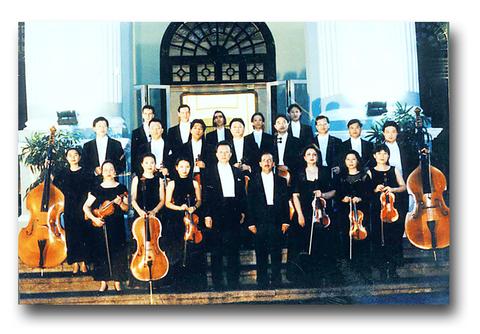Macau's annual music festivals are a delight -- relaxed affairs, with cheap ticket prices, in a picturesque city at the nicest time of the year on the South China coast.
It is essentially a classical music festival. But this year's event, the first since the former Portuguese enclave was handed back to China last December, is deliberately targeting a more popular audience.
This is not to say that the organizers are not aiming for quality at the same time. The festival's ambition appears to be to introduce all and sundry to the most accessible attractions the classical tradition has to offer.

PHOTO: LIBERTY TIMES
The festival begins and closes especially strongly. The opening event, the first of three performances of Verdi's opera Otello in a co-production with London's Royal Covent Garden Opera House, parades the best there is in the most sumptuous of musical art forms. One of the great baritones of the era, Paolo Coni, will sing the role of Iago.
The closing night will be unashamedly a crowd-pleaser -- Macau's first ever "cross-over" concert in which the worlds of pop and opera meet. Taiwan's CoCo Lee, Hong Kong's Eason Chan and Macau's Miro Pinto will share the stage with soloists from Otello, the Shanghai Symphony Orchestra and the National Opera of China Chorus from Beijing.
Between these two events there is a wide variety of offerings.

Photo: Macau Chamber Orchestra
The highlights are two nights of flamenco from the Spanish National Ballet, two nights of Tchaikovsky ballet (Sleeping Beauty and a mysterious "Tchaikovsky gala") from the National Ballet of Latvia, and what promises to be a very unusual evening from the Shanghai Opera's dance troupe.
In this last, Rachmaninov's immensely popular "Second Piano Concerto" and Orff's Carmina Burana are both being performed as ballet music. Orff's unique extravaganza, featuring lustful monks pursuing willing maidens, was written for the stage (in 1937) but is usually given in a concert version. Rachmaninov's concerto has probably never been used as a ballet score anywhere before.
Three of the events are free of charge. The first is a jazz concert by the Chicago Metropolitan Jazz Orchestra. Next comes Xian Xinghai's "Yellow River Cantata", given outdoors on the steps of the city's famous St Paul's Ruins. And the Macau Chamber Orchestra under Yuan Fang offers a free evening, mostly of Beethoven, inside the beautiful and recently restored St Dominic's Church.

Photo: Bradley Winterton
Then there's Gilbert Kaplan and Mahler's Second Symphony. Kaplan is a successful New York businessman who doubles as an amateur conductor, but only of this one symphony. He has performed it with some 40 orchestras worldwide. In Macau it will be with the Shanghai Symphony Orchestra, and the combined choruses of the National Opera of China and Shanghai Opera, plus soloists.
The festival's new Artistic Director, the Hong Kong-born opera tenor Warren Mok, is confident performances will sell out quickly.
"The Macau International Music Festival has become one of the most important festivals in Asia," he said in an interview. "This year we are trying to broaden the audience. We are promoting the festival as international and accessible, attractive to international visitors and to local audiences. My goal is to ensure the festival continues to blossom."

Photo: Bradley Winterton
The prominence of artists from Shanghai in this year's Macau festival is due to Mok's strong links with the city.
Returning to Asia from Europe in 1994 following almost a decade with the Deutsche Oper (German Opera) in Berlin, he immediately launched a new career that combined singing with opera production. His productions of Romeo and Juliet and Carmen in Shanghai in 1996 and 1997 were landmark events there, the first quality productions of Western operas for more than 50 years. Mok himself sang the leading male role in both productions.
Seat prices in Macau have always been reasonable. This year prices are NT$800 and below for all events except Otello and the closing gala, where seats range from NT$400 to NT$1,400. Tickets for some of the smaller events are all NT$400.

PhotO: Macau Chamber Orchestra
The festival conveniently ranges over three weekends. The first and last showings of Otello, for instance, are on Saturday nights, and two of the three free events take place on Sunday evenings.
First-time visitors to Macau should note that the place to go for after-concert relaxation is the sea-front a couple of hundred yards to the west of the Macau Cultural Centre (the venue for many of the concerts). A string of southern European-style cafes and restaurants have recently opened in this area, and they're never busier than around 10pm.
Macau is already a popular destination for people from Taiwan, even if many only touch down en route for China. The International Music Festival provides a good pretext for stopping over and getting to know the charms of the old Chinese/Portuguese entrepot a little bit better.

In the March 9 edition of the Taipei Times a piece by Ninon Godefroy ran with the headine “The quiet, gentle rhythm of Taiwan.” It started with the line “Taiwan is a small, humble place. There is no Eiffel Tower, no pyramids — no singular attraction that draws the world’s attention.” I laughed out loud at that. This was out of no disrespect for the author or the piece, which made some interesting analogies and good points about how both Din Tai Fung’s and Taiwan Semiconductor Manufacturing Co’s (TSMC, 台積電) meticulous attention to detail and quality are not quite up to

April 21 to April 27 Hsieh Er’s (謝娥) political fortunes were rising fast after she got out of jail and joined the Chinese Nationalist Party (KMT) in December 1945. Not only did she hold key positions in various committees, she was elected the only woman on the Taipei City Council and headed to Nanjing in 1946 as the sole Taiwanese female representative to the National Constituent Assembly. With the support of first lady Soong May-ling (宋美齡), she started the Taipei Women’s Association and Taiwan Provincial Women’s Association, where she

Chinese Nationalist Party (KMT) Chairman Eric Chu (朱立倫) hatched a bold plan to charge forward and seize the initiative when he held a protest in front of the Taipei City Prosecutors’ Office. Though risky, because illegal, its success would help tackle at least six problems facing both himself and the KMT. What he did not see coming was Taipei Mayor Chiang Wan-an (將萬安) tripping him up out of the gate. In spite of Chu being the most consequential and successful KMT chairman since the early 2010s — arguably saving the party from financial ruin and restoring its electoral viability —

It is one of the more remarkable facts of Taiwan history that it was never occupied or claimed by any of the numerous kingdoms of southern China — Han or otherwise — that lay just across the water from it. None of their brilliant ministers ever discovered that Taiwan was a “core interest” of the state whose annexation was “inevitable.” As Paul Kua notes in an excellent monograph laying out how the Portuguese gave Taiwan the name “Formosa,” the first Europeans to express an interest in occupying Taiwan were the Spanish. Tonio Andrade in his seminal work, How Taiwan Became Chinese,